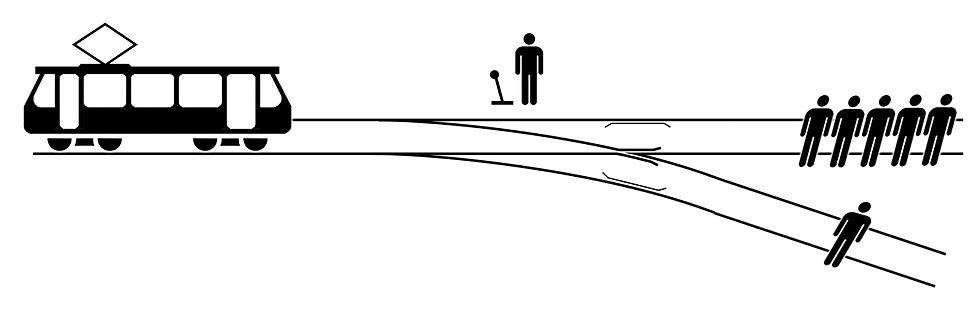Applying Religious Studies To Everyday Life
- Titanium Tutors

- Oct 12, 2021
- 4 min read
Is RS a useful subject to study, and what relevance does it have to day-to-day life?

In my first ‘A’ level Religious Studies (RS) class, my teacher presented us with the ‘trolley problem’. Watch this TED talk for more detail, but this essentially the dilemma:
You see a runaway trolley (or tram) moving towards five people who are lying on the tracks, tied down. You have the ability to pull a lever, which would redirect the trolley onto another track, where there is only one person lying down. Do you take action, so less people die overall? Or do you do nothing, and let the people die?

So, as the TED talk puts it: “do we pick the action with the best outcome, or stick to a moral code that prohibits causing someone’s death?”
I couldn’t get this out of my head for the rest of the day – we debated over it in class, and I still could not figure out which was ethically viable. Maybe one way or the other seems obvious to you, but the more we debated it, the more I came to believe that neither option was truly ethical.
One of the best things about studying religion is how applicable it can be to your everyday life. Admittedly, you will probably never be faced with the ‘trolley problem’ scenario. However, you do make ethical decisions on an everyday basis, and this kind of thinking may help you to navigate them with more accuracy.
If you are willing to be open-minded, RS can test your own moral values and religious views. Something Religious Studies is excellent for is developing your critical thinking skills: your ability to put views to the test, and not accept something as truth before careful evaluation. This is imperative for everyday life – whether in politics, personal relationships, or your everyday decisions.
Religious Studies is also excellent at helping you see other people’s viewpoints. With England being highly multicultural, if you are able to understand the background behind lots of different religions, this will be a strength in many areas of your life. Learning about other religions in a formal setting is an excellent chance to develop better understanding of other people’s viewpoints, even if they are polar opposite to your own.
Now, it is time to dispel some myths:
1) MYTH: You must be religious to study RS
This is absolutely not true. While it may seem more appealing to people who have grown up religious, learning about other faiths that are present in our culture, not matter your own faith, will be applicable to your everyday life, and help to you be more understanding and knowledgeable.
In essays and debates, you are always free to oppose the existence of God. The best RS classrooms are those which have a mixture of different opinions to spark debate, and so being religious really is not a pre-requisite.
2) MYTH: You have to be confident at debating to study RS
This is also not true! RS classrooms are all about learning – true, you may have a lot of debates, but you don’t have to be a dominant personality to have something to say. The critical skills that you will cultivate throughout your course will certainly be enough to allow you to critique your classmate’s viewpoint without having to be loud or confident.
3) MYTH: RS isn’t a useful qualification (GCSE or ‘A’ Level)
Depending on what you decide to do in the future, RS GCSE or ‘A’ level may or may not be directly applicable to your course. Personally, studying English Literature at university, RS was probably my most useful ‘A’ level, as those critical thinking skills, and the practice at engaging with philosophers, are directly applicable to every essay I write.
However, if you are not planning on studying humanities at university, I would still argue that it is incredibly useful. Even when it comes to things like voting in elections, it is helpful to be engaged in current debates and to be used to deconstructing and critiquing arguments, which RS will help you with.
Why get a religious studies tutor?
Overall, Religious Studies asks you big questions. But these are the most important questions in life. Being a ‘thinker’ is perhaps an undervalued attribute – study RS to be more culturally engaged, more knowledgeable of current events, and be able to throw some Latin into general conversation – it always makes you seem more intelligent.
Get started on thinking about Religious Studies today by browsing the links below to GCSE and A-Level syllabuses, to see what areas they cover. You may also like to check out the video links to interesting TED talks to get your thinking going…
Links to recommended philosophy videos:
1) Why is the universe fined-tuned for life? TED talk https://www.youtube.com/watch?v=bf7BXwVeyWw
2) The lethality of loneliness -TED talk https://www.youtube.com/watch?v=_0hxl03JoA0
3) Utilitarianism summary video:
4) Virtue theory summary video:
Religious Studies GCSE syllabuses:
Religious Studies ‘A’ Level syllabuses:

Blog Post Crafted by Genevieve
Genevieve is currently working towards her bachelors in English Literature at the University of Warwick.
Born in Coventry, she now tutors English SATs and GCSE in her free time, as well as working for the university as an outreach ambassador in local schools.
She also enjoys playing piano and flute, and often performs as a backing singer at local gigs.
Whenever she has a moment to spare, you might find her driving to the beach or catching up on her reading!








Comments